Cortisol is a hormone produced by the adrenal gland. The cortisol levels can go up in various conditions, some of which are physiological, and some are pathological. Like many other hormones, cortisol is produced in a circadian rhythm: cortisol levels are highest on waking up and lowest during sleep. Cortisol is vital in the body’s response to stress; it helps increase blood pressure and glucose production and plays a crucial role in maintaining normal blood pressure.
Cortisol increases during stress. It can also increase during intense exercise, pregnancy, trauma and infections. Cortisol levels can get altered during anxiety, depression, insomnia and night work.
There is a complex relationship between weight and cortisol levels. Persistent high cortisol levels associated with chronic stress are believed to be one of the mechanisms for weight gain ( but not the only one !). Further, obesity itself leads to high cortisol levels.
However, high cortisol levels leading to obesity are found in a condition called Cushing’s syndrome. In this condition, high cortisol production directly from an adrenal tumour or from a pituitary gland tumour producing ACTH leads to a constellation of symptoms called Cushing’s syndrome. This is a rare cause of obesity.
So, high cortisol per se is a rare cause of obesity, but cortisol can be considered a cause of weight gain. By managing stress, getting 7-8 hours of sleep and regular exercise can help you keep your cortisol levels under check!
Dr. Mathew John, MD,DM



